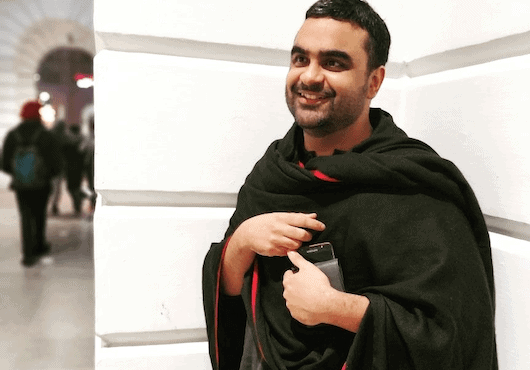Akhil Katyal came to Hindu College on 5 November and did a reading of his different poems among which were his famous pieces that have captured the youth through social media.
It wouldn’t be wise to make it sound generic and limit it to calling it solely an enriching experience, although it was, but it truly was mostly poetic. Katyal had an interactive session that followed it. Questions ranged from his most favourite poet Agha Shahid Ali to Faiz Ahmed Faiz. Shahid was quoted multiple times in the course of the beautiful session. From questions that were targeted on pieces within “Country Without a Post Office” to his newest works.
A lot of talks were also targeted on the young adult approach to poetry wherein a student asked if he could invent his own style. To which Katyal said, styles become recognised if everyone else starts doing it which of course also involves a process of keeping indefinite patience on the creator’s behalf.
Katyal was witty, sharp with his words and understood things that went on in our minds. Whether it be the comparisons of longingness in poetry in Faiz or the same in Shahid. Whether it was Katyal’s own pieces on 377 and queer support or just general perceptions of our messed up city and world, he did leave behind a mark of his own in that hour of curiosity, love and more.
It truly was lovely to hear, “the world is full of paper, write to me.”
Katyal went on to talk passionately about his professor from his time at Hindu College, Dr. Lalita Subbu. He heartily credited her as his model of inspiration to enter into this frenzy of poetic liberty and its explorations into the social backgrounds. In a candid session, Katyal discussed the politics of Section 377 and humored the audience with his sarcastic sadness upon the decriminalization of same-sex relations; claiming the Supreme Court’s decision to rendering his “two poems invalid”.
Interestingly Katyal also talked about the essence of language as a medium. Katyal has a background wherein he works with translations extensively. The idea of “lost in translation” is of little importance to him. Emphasis was laid on having the sentiment, the emotion to work on poetry, language being a medium to translate such powerful emotions into art. It was meant to show the young students the power of our aboriginal languages of Urdu and Punjabi. Katyal recited a beautiful piece translated to Punjabi by his student in Ramjas College to display the exuberance.
“Jivein haan ovein hi haan,
Apni marzi di kardi haan,
Jivein ivein hi pasand haan,
Toh ad ja meri aad vich.
Ni te zara suni,
Tu khunje maar bhaad vich.”
He said, “Go back to your poetry and you will observe patterns in your writing when you are write in a particular language.” His love of urdu and urdu poetry is inspiring, to say the least. The passion with which he talks of his favorite poets Faiz or Shahid Ali or Amrita Pritam inspired the room full of enthusiastic Hinduites willing to learn from Katyal the intricacies of effective and hard-hitting poetry.
It was in totality a mesmerising event where the spirit of poetry, the mutual love of language and expression was celebrated in such a way that it still reverberates in all our hearts and ignites a spark of inspiration to just, as Katyal put it, “keep reading to find great influence, write and most importantly experiment with your ideas because who knows when you might actually succeed in inventing a new form in which we all might be writing our next poems.”
Feature Image Credits: Brown Paper Bag
DU Beat





Comments are closed.